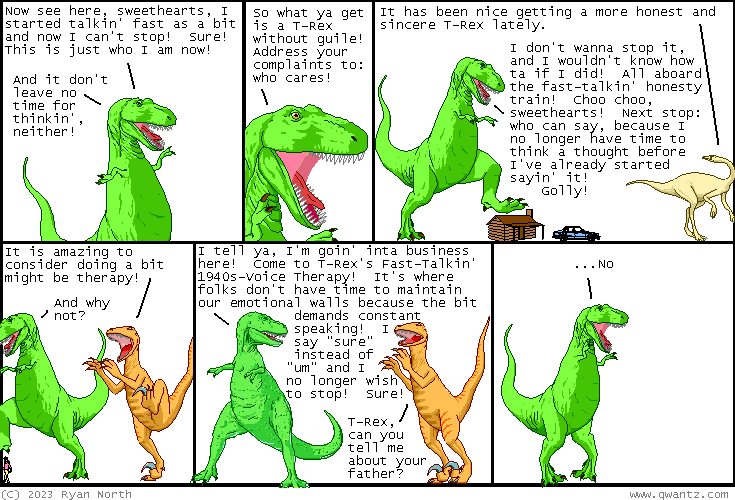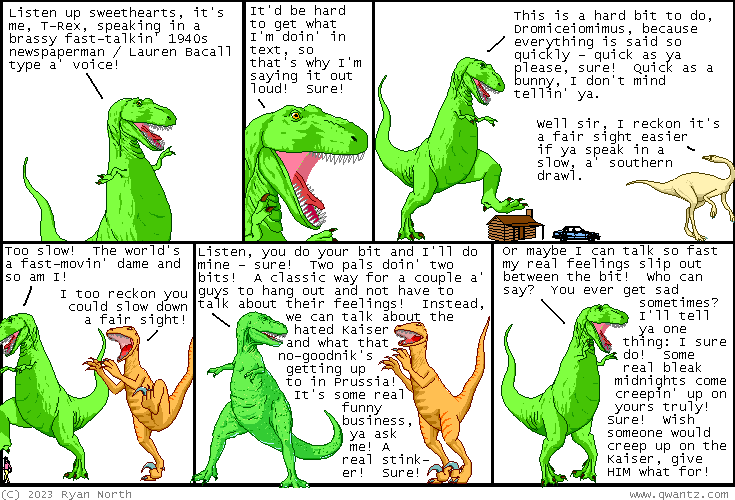Historical speech styles
« previous post | next post »
A recent Dinosaur Comics strip features T-Rex imitating (a certain kind of) speech style from the 1940s:
Mouseover title: "to t-rex's mind, and mine as well, all of the past takes place around the 1930s. well sure! and why not?"
The next strip:

Mouseover title: "you want a gender-neutral way to address a room, well here it is, sweethearts! "sweethearts"! sure!"
Although Ryan's imitation is persuasively evocative in general, I can't find gender-neutral "sweetheart(s)" actually used in any 1930s (or 1940s) novels — though maybe he's connecting to some movie dialog? No doubt commenters will have suggestions.
Meanwhile in New Hampshire, a reporter asked Ron DeSantis why he didn't take questions after his stump speech. DeSantis, who was talking to individual audience members, responded "Are you blind?" — which Josh Marshall perceived as a phrase from the 1950s:
Another day, another awkward Meatball Ron moment … “are you blind?” The 1950s called they want Meatball Ron to send their idiom back. https://t.co/AFzIKXK0qd
— Josh Marshall (@joshtpm) June 1, 2023
The interaction was covered widely in mass and social media, either as an example of DeSantis's temper, or reporters' bias, or both. But the "1950s idiom" impression is not one that I share — what do others think?

Nathan said,
June 2, 2023 @ 8:33 am
"Are you blind?" doesn't even feel dated to this Gen Xer.
On the other hand, there hasn't been a Kaiser since 1918.
Doug said,
June 2, 2023 @ 8:50 am
While I would not associate this use of "Are you blind?" with the 1950s specifically, it is generically old-fashioned, in the sense that I would not be surprised to be rebuked for using it nowadays, on the gorunds that it's arguably insensitive to persons with a disability.
DaveK said,
June 2, 2023 @ 9:12 am
Wilhelm II was still alive in the early 1940’s but he had been in exile for decades. I doubt that fast-talking dames from the ‘40’s could spare much bandwidth for him. And Lauren Bacall’s delivery was kind of languid and smoky ias I recall
Kelly said,
June 2, 2023 @ 9:14 am
I've been watching a lot of forgotten '30s and '40s films lately, and the chunk that rings the most true for me is "address your complaints to: who cares."
Doug said,
June 2, 2023 @ 9:22 am
Readers here may be interested to know there's a whole book on "Fast-Talking Dames":
https://archive.nytimes.com/www.nytimes.com/books/01/06/03/reviews/010603.03gottlit.html
Doctor Duck said,
June 2, 2023 @ 10:12 am
I think it would have felt more dated if he'd said "Whadda you, blind?"
cameron said,
June 2, 2023 @ 11:28 am
I suspect when T-Rex refers to Lauren Bacall, he's actually thinking of Rosalind Russell's character in "His Girl Friday"
John Swindle said,
June 2, 2023 @ 1:45 pm
Sounds a bit like a Groucho Marx movie, which would be the right era and maybe the right region (more New York, Groucho, Bacall, network radio, than Hollywood).
Jon W said,
June 2, 2023 @ 5:38 pm
In 1930s and 40s movies, Jimmy Cagney seems to use "sweetheart" in addressing both women and men. Here are two examples of the latter.
Louis Johnson : All right, Patsy. I'll speak to the old man
Patsy : Now you're talking, sweetheart.
https://www.imdb.com/title/tt0024314/characters/nm0000010
Steve Case : Nick, you're lookin' swell.
Nick Butler : Oh, Look at the Captain of the all-American rat team.
You know, Sweetheart, I ought to belt you right in the puss for
sending me down that swamp.
https://www.imdb.com/title/tt0033175/characters/nm0000010
Chris Barts said,
June 2, 2023 @ 6:36 pm
I'm a Millennial and I don't find "Are you blind?" dated in the slightest.
Michèle Sharik Pituley said,
June 2, 2023 @ 6:50 pm
Shouldn’t it be “schweethearts”?
Every time I hear that style of speech, I think of that Star Trek TOS episode “A Piece of the Action”.
Michèle Sharik Pituley said,
June 2, 2023 @ 6:57 pm
@Chris Barts — “I'm a Millennial and I don't find "Are you blind?" dated in the slightest.”
LOL I’m Gen X & I remember when I began saying that about things. Songs, saying, etc. There are more every year. IOW, welcome to middle age. ;-)
JPL said,
June 2, 2023 @ 9:08 pm
My question has always been, is that speech style one that was common in real society (or at least in New York) back in those days, and it no longer is, or is it a speech style that is only found in films of that era? I suspect it's the latter. But, if so, the question of why that style is characteristic of films of that era, and why speech was portrayed in that way in those films, is an interesting one. Was the use of that style a choice of the directors or the actors, or maybe the producers, or simply assumed by everybody? In contrast to today's films, where the dialogue is portrayed in a more "realist" way, this style seems to reflect and impose more a conventional idea of how people using language should sound, but in an era where the relation between the speech sounds and the possibility of thoughts impelling expression was not a part of the conventional understanding of language, and a superficial behaviourism and Machian phenomenalism was the order of the day. It's not just the speed, but the question of where the expressions are coming from in the minds of the speakers. What is the central difference between that speech style, as a portrayal of language users, and the one found in contemporary films? (It's probably related somehow to the differences in speech style (as opposed to normal language use) found in the theatre tradition.)
The slang of that era is another interesting area of exploration. Modernism, the beat generation, hipsters (old sense): social changes seemed to generate a rich repertoire of slang. "Cigarette holder, which wigs me; over his shoulder, he digs me." from "Satin Doll": I'm always intrigued by that "wigs me". What exactly is its sense?
Rodger C said,
June 3, 2023 @ 2:01 pm
I think "wigs me" = "drives me crazy"; from "wig" v., to go crazy, from "flip one's wig."
Brett said,
June 3, 2023 @ 10:28 pm
As cameron said, T-Rex says Lauren Bacall, but my immediate reaction was that he was really thinking of Rosalind Russell. However, I was curious, so I had a look at Key Largo. In the scene starting around the 20:00 mark, Bacall does sometimes seem to speak just a little bit faster than one might ordinary expect, and Bogart sometimes does as well—although neither of them seems particularly out of the ordinary.